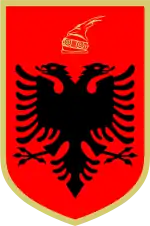Democratic Party of Albania
The Democratic Party of Albania (Albanian: Partia Demokratike e Shqipërisë, PD or PDSh) is a conservative[2][3][4] political party in Albania. They became the leading party in the governing coalition following the 2005 parliamentary elections.
Democratic Party of Albania Partia Demokratike e Shqipërisë | |
|---|---|
 | |
| Albanian name | Partia Demokratike e Shqipërisë |
| Leader | Lulzim Basha |
| Leader of the Parliamentary Group | Edmond Spaho |
| General Secretary | Gazment Bardhi |
| Founder | Aleksandër Meksi |
| Founded | 12 December 1990[1] |
| Headquarters | Bulevardi Zhan D'Ark 11, 1001 Tirana, Albania |
| Newspaper | Rilindja Demokratike |
| Student wing | Grupimi Rinor Universitar Demokrat |
| Youth wing | Forumi Rinor i Partise Demokratike |
| Membership (2019) | 113,220 |
| Ideology | Conservatism[2][3][4] Liberal conservatism[5] Pro-Europeanism[5] |
| Political position | Centre-right[5] |
| European affiliation | European People's Party (associate)[6] |
| International affiliation | Centrist Democrat International International Democrat Union |
| Slogan | Shqipëria si Europa! (Albania like Europe!) |
| National Assembly | 45 / 140 [None claimed from the party which withdrew from parliament in February 2019] |
| Municipality | 1 / 61 [Boycotted Municipal Elections on June 30, 2019] |
| Website | |
| www | |
 |
|---|
| This article is part of a series on the politics and government of Albania |
Since September 2013, they have been the largest opposition party in the country, following their defeat at the hands of the Socialists in the 2013 Albanian parliamentary election. It is an associate member of the European People's Party (EPP) and a full member of the International Democrat Union and Centrist Democrat International.[7][6][8] Rilindja Demokratike is the party's official newspaper.[9] Its youth organisation, FRPD, is one of the founders of the Youth of the European People's Party (YEPP), in which they are also full active members.
The party's current leader since 2013 is Lulzim Basha.
History
The party was founded on 12 December 1990 by Avdyl Matoshi, Azem Hajdari, Sali Berisha and Gramoz Pashko.[10] Arben Imami, Edmond Budina, Eduart Selami, Genc Ruli, Merita Zaloshnja and Aleksandër Meksi also took part in the early activities of the party. It was the first opposition party after they were legalized.
The party came to power in 1992 after winning the 1992 parliamentary election under the leadership of Sali Berisha and Aleksander Meksi and ruled until 1997. The government resigned in 1997 following a scandal over massive corruption during which a civil war nearly broke out. It was part of the Union for Victory (Bashkimi për Fitoren) coalition, which received 37.1 percent of the vote in the 2001 elections and 46 members of parliament.
In the 2005 parliamentary elections, the Democratic Party won 56 of the 140 seats and its allies won 18 under the call Time for Changes (Koha per Ndryshim). Two other parties also joined the new coalition (PAA of the left wing & PBDNJ of the Greek minority, with 4 and 2 seats, respectively). This meant that with a combined total of 79 seats, the Democratic Party and its allies were able to form a government with Sali Berisha becoming Prime Minister. One of his priorities was Albanian integration to NATO, an objective he accomplished in 2009 when Albania and Croatia were accepted as members.
After the defeat in the 2013 parliamentary election, Berisha announced his resignation as party leader. A one-member-one-vote election was held for the first time on 23 July 2013, in which Lulzim Basha defeated his opponent Sokol Olldashi and was elected chairman of the Democratic Party.[11][12]
On 30 September 2014, a national congress of the Democratic Party was held to elect a new leadership and to announce a tough reform of the party.[13]
On the 26th anniversary of the Democratic Party, party leader Basha announced his program for the further modernization and democratization of the party ahead of the 2017 parliamentary elections.
After previously promising that 35% of the parliamentary candidates would consist of members from the youth movement of the Party, Basha now announced a limitations of all mandates of the party leaders to a two-year term, and the full democratization of the internal election process.[14]
On 18 February 2017 members of the Democratic Party and other opposition parties, under the leadership of Basha pitched a giant tent outside the Prime Minister's office in Tirana after thousands of protesters rallied to demand free elections and a technocrat government. The opposition protest further escalated into a larger political conflict. The Democratic Party and its allies refused to register to take part in the June 18 general election, until the government will accept their conditions to secure a free and democratic election.[15][16]
Headquarters
The party's headquarters is in Tirana, 50m from the Albanian parliament. The Rilindja Demokratike newspaper shares the building with the Democratic Party.
Election results
| Year | Votes | % | Seats | Position | +/– | Government |
|---|---|---|---|---|---|---|
| 1991 | 720,948 | 38.7% | 75 / 250 | 2nd | Opposition | |
| 1992 | 1,046,193 | 57.3% | 92 / 140 | 1st | Coalition | |
| 1996 | 914,218 | 55.2% | 122 / 140 | 1st | Coalition | |
| 1997 | 315,677 | 24.1% | 40 / 155 | 2nd | Opposition | |
| 2001 | 494,272 | 36.9% | 46 / 140 | 2nd | Opposition | |
| 2005 | 602,066 | 44,1% | 56 / 140 | 1st | Coalition | |
| 2009 | 610,463 | 40.2% | 68 / 140 | 2nd | Coalition | |
| 2013 | 528,373 | 30.6% | 50 / 140 | 2nd | Opposition | |
| 2017 | 427,778 | 28.8% | 43 / 140 | 2nd | Opposition |
Party leaders
| Person | Period |
|---|---|
| Sali Berisha | 1991 – 1992 |
| Eduart Selami | 1992 – 1995 |
| Tritan Shehu (acting) | 1995 |
| Tritan Shehu | 1995 – 1997 |
| Genc Pollo (interim) | 1997 |
| Sali Berisha | 1997 – 2013 |
| Lulzim Basha | 2013 – |
2009 national elections
After the Albanian parliament elections of 2009 the Democrats won 67 MPs. The current list as of September 2011:[17][18]
- Adriana Gjonaj
- Albana Vokshi
- Aldo Bumçi
- Arben Imami
- Ardian Turku
- Arenca Trashani
- Astrit Bushati
- Astrit Patozi
- Aurel Bylykbashi
- Bedri Hoxha
- Besnik Dushaj
- Dashnor Sula
- Edi Paloka
- Edmond Spaho
- Eduard Halimi
- Enkelejd Alibeaj
- Fatbardh Kadilli
- Fatos Beja
- Fatos Hoxha
- Flamur Noka
- Florion Mima
- Genc Pollo
- Genc Ruli
- Gent Strazimiri
- Gerti Bogdani
- Gjergji Papa
- Gjok Uldedaj
- Igli Cara
- Ilir Bano
- Ilir Rusmali
- Ismail Hoxha
- Jemin Gjana
- Jozefina Topalli
- Kosta Barka
- Kreshnik Çipi
- Lajla Pernaska
- Ledina Aliolli
- Lefter Maliqi
- Leonard Demi
- Luan Skuqi
- Luçiano Boçi
- Majlinda Bregu
- Mark Marku
- Mehmet Xheka
- Mesila Doda
- Myqerem Tafaj
- Ndriçim Babasi
- Ndue Paluca
- Osman Metalla
- Paulina Hoti
- Rahim Çota
- Rajmonda Bulku
- Ramiz Çobaj
- Ridvan Bode
- Rrajmond Hoxha
- Sali Berisha
- Selami Xhepa
- Sherefedin Shehu
- Sokol Olldashi
- Spiro Ksera
- Sybi Hida
- Tritan Shehu
- Vasillaq Ngresi
- Vath Tabaku
- Viktor Gumi
- Ylli Lama
2013 national elections
After the Albanian parliament elections of 2013 the Democrats won 45 MPs. The current list as of September 2013:
- Alban Zeneli
- Albana Vokshi
- Albina Deda
- Aldo Bumçi
- Arben Imami
- Arben Ristani
- Ardian Turku
- Astrit Patozi
- Astrit Veliaj
- Bedri Hoxha
- Besnik Dusha
- Dashamir Shehi
- Edi Paloka
- Edmond Spaho
- Eduard Halimi
- Eduard Selami
- Eleina Qirici
- Flamur Noka
- Florion Mima
- Genc Pollo
- Genc Ruli
- Gent Strazimiri
- Gerti Bogdani
- Gjergji Papa
- Gjovalin Bzheta
- Gjovalin Kadeli
- Halim Kosova
- Helidon Bushati
- Igli Cara
- Jorida Tabaku
- Jozefina Topalli
- Kastriot Islami
- Keltis Kruja
- Kozma Dashi
- Liljana Elmazi
- Luçiano Boçi
- Majlinda Bregu
- Mesila Doda
- Myqerem Tafaj
- Oerd Bylykbashi
- Ridvan Bode
- Roland Keta
- Sali Berisha
- Sherefedin Shehu
- Sokol Olldashi
- Voltana Ademi
2017 national elections
In the general elections of 2017 DP won 43 out of 140 seats in parliament coming second after only SP and being the main largest party of the opposition of Albania and its leader, Lulzim Basha the leader of opposition.
En Bloc Leaving of the Parliament
As of May 2019 the opposition MPs consisting of DP, SMI and other minor parties left their MP mandates accusing the Government of manipulating the elections due to some evidences provided by international media. Since then 17 deputies have accepted the mandate to replace resigned MPs. As of June 2019, the opposition has organised 7 massive national protests and several smaller ones in the capital, Tirana.
References
- Robert Elsie (2010) Historical Dictionary of Albania, Scarecrow Press, pxliii
- Nordsieck, Wolfram (2017). "Albania". Parties and Elections in Europe.
- Slomp, Hans (26 September 2011). Europe, A Political Profile: An American Companion to European Politics. ABC-CLIO. p. 605. ISBN 978-0-313-39182-8.
- Paul G. Lewis (2000). Political Parties in Post-Communist Eastern Europe. Routledge. pp. 53–. ISBN 978-0-415-20182-7. Retrieved 6 February 2013.
- "The Albanian Electoral Systems since 1990" (PDF). Albanian Elections Observatory Brief. Hellenic Foundation for European & Foreign Policy (1). 19 April 2013. Retrieved 2 July 2013.
- "Parties and Partners". European People's Party.
- "Key Political Parties in Albania". Balkaninsight.
- "Partia Demokratike e Shqipërisë". Eurofactbook. Archived from the original on 2016-08-09. Retrieved 2011-04-30.
- "Partia Demokratike e Shqipërisë". PD.AL. Archived from the original on 2011-10-07.
- Doder, Dusko (20 January 1991). "At Last, Albanians Feel Winds of Change". The Chicago Tribune. Tirana. Retrieved 5 July 2013.
- "Basha Elected Head of Albania's Democrats :: Balkan Insight". www.balkaninsight.com. Retrieved 2017-03-20.
- Times, Tirana (2013-07-26). "Basha elected new Democratic Party leader". Tirana Times. Retrieved 2017-03-20.
- albania-opposition-party-elects-new-leadership
- "Basha Announces Thorough Reform of PD - Exit". Exit. 2016-12-11. Retrieved 2017-03-20.
- "Albanian protesters rally, pitch tent to demand free elections". 18 February 2017. Retrieved 25 June 2017 – via Reuters.
- "Albania Opposition Parties to Boycott June Elections :: Balkan Insight". www.balkaninsight.com. Retrieved 25 June 2017.
- "Parliamentary group". pd.al.
- "List of elected members". Albanian parliament. Archived from the original on 2011-05-14.
| Wikiquote has quotations related to: Democratic Party |